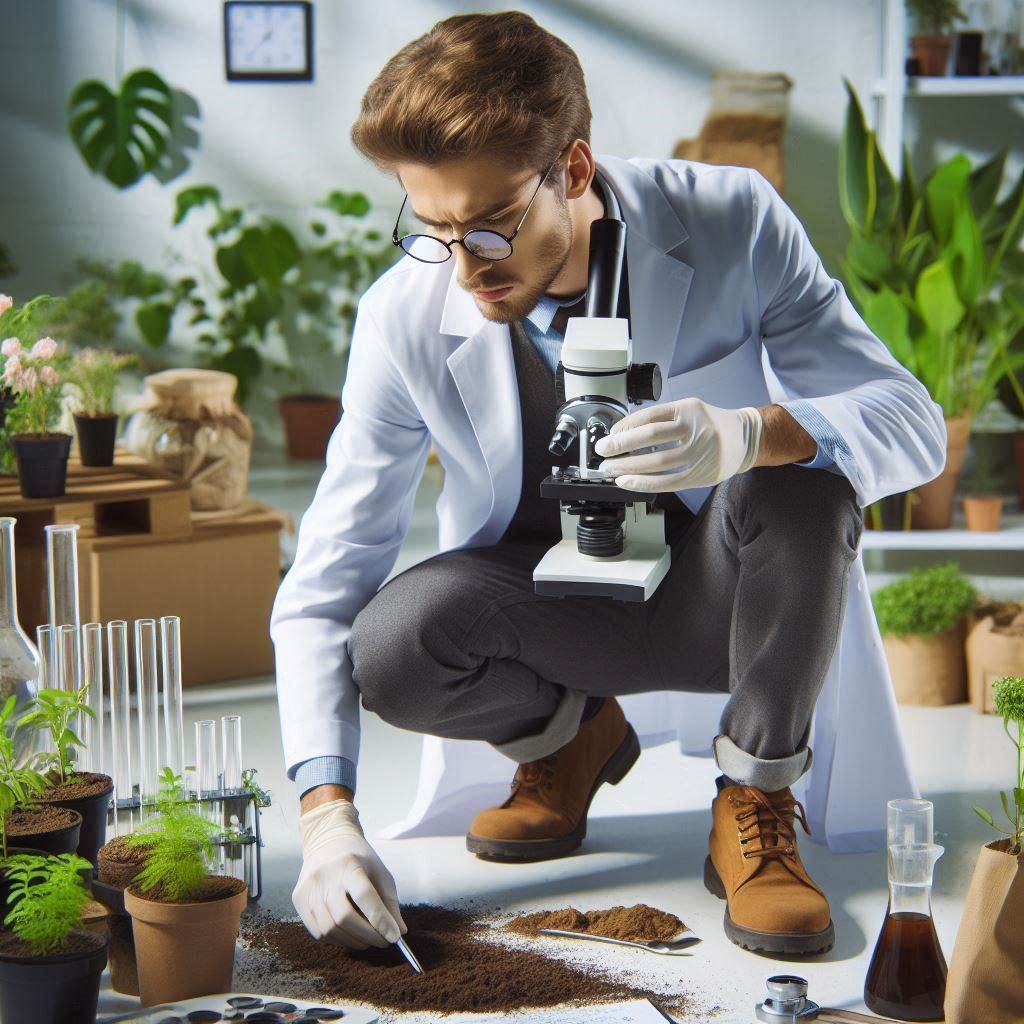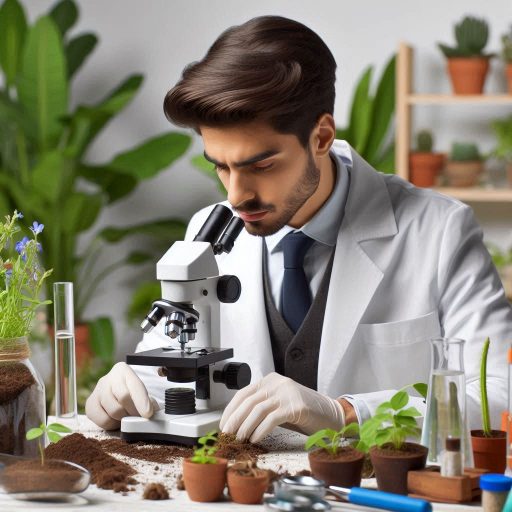Introduction
Soil scientists play a vital role in understanding the complex interactions within soil ecosystems.
They specialize in studying soil properties, composition, and processes to provide insights that are essential for various applications.
By examining soil health and quality, these professionals help guide agricultural practices, environmental conservation efforts, and land development initiatives.
In agriculture, soil scientists are crucial for optimizing crop production.
They analyze soil conditions to recommend practices that enhance fertility and yield.
Their expertise helps farmers make informed decisions about soil management, leading to sustainable farming practices that increase productivity while protecting the environment.
Soil scientists also contribute significantly to environmental conservation.
They assess the impact of land use on soil health and develop strategies to prevent degradation.
Their work is essential for restoring contaminated lands and promoting practices that enhance soil resilience.
Moreover, in land development, soil scientists evaluate the suitability of land for construction, infrastructure, and urban planning.
Their insights ensure that development projects consider soil stability and drainage, minimizing risks associated with erosion and runoff.
Overall, soil scientists are indispensable in promoting sustainable land use and fostering a healthier planet.
What is Soil Science?
Define Soil Science and Its Importance
Soil science is the study of soil as a natural resource.
It encompasses the formation, classification, and mapping of soils.
Soil scientists investigate the physical, chemical, biological, and mineralogical properties of soils.
This field plays a crucial role in agriculture, environmental science, and land management.
Soil science is vital for understanding how soil affects ecosystems.
Healthy soils support plant growth and sustain agricultural production.
They also regulate water flow, filter pollutants, and store carbon.
By studying soil, scientists can help manage resources sustainably and address environmental issues.
The Various Elements and Components of Soil That Soil Scientists Study and Analyze
Several key components make up soil.
These include minerals, organic matter, water, air, and living organisms.
Minerals provide essential nutrients for plants.
They come from the weathering of rocks and contribute to soil structure.
Organic matter consists of decomposed plant and animal material.
It enriches the soil with nutrients and enhances its ability to retain moisture.
Soil scientists analyze the amount and type of organic matter present in soil profiles.
This analysis helps determine soil fertility and health.
Water is another essential component of soil.
It acts as a solvent for nutrients and supports plant life.
Soil scientists study how water interacts with soil particles and influences drainage.
They also examine how water availability affects crop yield and land use.
Air is crucial for soil respiration.
It contains oxygen necessary for root and microbial activity.
Soil scientists analyze soil aeration, which affects plant growth and nutrient availability.
Poorly aerated soils can lead to plant stress and reduced productivity.
Living organisms, such as bacteria, fungi, and earthworms, play a vital role in soil health.
They help decompose organic matter and cycle nutrients.
Soil scientists study these organisms to understand their impact on soil fertility and structure.
Soil scientists use various techniques to study these components.
They collect soil samples and perform laboratory analyses.
Field studies help scientists observe soil behavior in different environmental conditions.
Remote sensing technology allows for large-scale soil mapping and monitoring.
The knowledge gained from soil science is essential for several applications.
Farmers rely on soil scientists for advice on crop selection and soil management practices.
Environmental agencies use soil data to assess land degradation and pollution.
Urban planners need soil information for sustainable land development.
Soil science is a critical field that examines the complexities of soil.
It involves studying its components and their interactions.
By understanding soil, scientists contribute to sustainable land use and environmental conservation.
Read: Challenges and Rewards: The Dual Life of an U.S. Environmental Scientist
Responsibilities of a Soil Scientist
The Main Tasks and Responsibilities of a Soil Scientist
Soil scientists have various tasks and responsibilities that are essential for understanding soil health and management.
One of their primary responsibilities is to conduct soil surveys.
They collect data on soil types, distribution, and properties across different regions.
This information helps inform land use planning and agricultural practices.
Soil scientists also assess soil fertility.
They analyze nutrient levels and identify deficiencies that may affect crop growth.
By providing recommendations on soil amendments, they help farmers improve yield and sustainability.
Another important task is to evaluate soil erosion and degradation.
Soil scientists study the effects of land use practices on soil health.
They develop strategies to mitigate erosion and restore degraded lands.
Soil scientists often work with policymakers and land managers.
They provide expertise on environmental regulations related to soil conservation.
They help ensure that land use practices align with sustainable development goals.
Additionally, soil scientists engage in public education.
They raise awareness about soil health and its importance in ecosystems.
Through workshops and outreach programs, they share knowledge on best practices for soil management.
How Soil Scientists Conduct Research, Collect Samples, and Analyze Data to Make Recommendations
Soil scientists conduct research to advance the field of soil science.
They design experiments to study soil behavior under various conditions.
This research often involves fieldwork, laboratory analysis, and data interpretation.
To collect soil samples, soil scientists use specific tools and techniques.
They may employ soil augers, probes, or shovels to obtain samples from different depths.
Proper sampling methods ensure that the samples represent the soil profile accurately.
Once samples are collected, soil scientists analyze them in laboratories.
They test for various properties, including pH, nutrient levels, and organic matter content.
This analysis helps identify the soil’s strengths and weaknesses.
Data analysis is a critical step in the research process.
Soil scientists use statistical methods to interpret the results of their analyses.
They identify trends and correlations that inform their recommendations.
Based on their findings, soil scientists provide actionable recommendations.
They advise on soil management practices, such as crop rotation, cover cropping, and the application of fertilizers.
Their recommendations aim to enhance soil health and promote sustainable land use.
Soil scientists also communicate their findings to various stakeholders.
They prepare reports and presentations for farmers, landowners, and policymakers.
Clear communication ensures that their research is understood and applied effectively.
Soil scientists have diverse responsibilities that include conducting research, collecting samples, and analyzing data.
Their work is vital for understanding soil health and promoting sustainable practices.
By providing recommendations based on scientific evidence, they contribute to better soil management and environmental conservation.
Read: Job Market Trends: Future of Chemistry Jobs in America
Importance of Soil Scientists in Agriculture
The Role of Soil Scientists in Improving Crop Production and Soil Fertility
Soil scientists play a crucial role in enhancing crop production and soil fertility.
They assess soil health by analyzing its physical, chemical, and biological properties.
This assessment helps determine the nutrient needs of crops, enabling farmers to make informed decisions.
By conducting soil tests, soil scientists identify nutrient deficiencies and recommend appropriate fertilizers.
They guide farmers on the optimal timing and methods for fertilizer application.
This ensures that crops receive the necessary nutrients at the right growth stages.
Soil scientists also develop soil management plans tailored to specific crops and conditions.
They consider factors such as soil type, climate, and land use.
These plans help maximize crop yield while minimizing environmental impact.
Additionally, soil scientists research the effects of different agricultural practices on soil health.
They study crop rotation, cover cropping, and reduced tillage methods.
These practices can improve soil structure, enhance nutrient cycling, and increase organic matter content.
By promoting these practices, soil scientists help maintain soil fertility over the long term.
This is essential for sustainable agriculture, as healthy soils support higher productivity and resilience to pests and diseases.
How Soil Scientists Help Farmers Optimize Soil Health and Quality for Sustainable Agriculture Practices
Soil scientists assist farmers in optimizing soil health and quality through education and research.
They provide training on sustainable soil management practices that improve soil health.
This education includes topics like organic matter addition, composting, and soil conservation techniques.
Soil scientists also conduct field demonstrations to showcase best practices.
These hands-on experiences allow farmers to see the benefits of improved soil management firsthand.
They help build trust and encourage the adoption of sustainable practices.
In addition, soil scientists monitor soil health over time.
They establish baseline data and track changes resulting from specific agricultural practices.
This long-term monitoring helps identify successful strategies and areas needing improvement.
Soil scientists collaborate with farmers to implement precision agriculture techniques.
These techniques utilize data-driven approaches to manage soil and crop inputs efficiently.
By analyzing soil variability within fields, soil scientists help farmers apply fertilizers and amendments where needed, reducing waste and costs.
Soil health is critical for water retention and erosion control.
Healthy soils reduce runoff and improve water infiltration, benefiting both crops and the environment.
Soil scientists guide farmers on practices that enhance these qualities, leading to more sustainable agricultural systems.
Furthermore, soil scientists advocate for policies that promote sustainable land use.
They work with government agencies to develop regulations that protect soil resources.
By influencing policy, soil scientists contribute to broader efforts in sustainable agriculture.
Soil scientists are essential to improving crop production and soil fertility.
They provide valuable insights and recommendations that help farmers optimize soil health.
Through education, research, and collaboration, soil scientists promote sustainable agricultural practices that benefit both farmers and the environment.
Read: Challenges and Rewards: Navigating the Chemist Career Path

Impact of Soil Scientists on Environmental Conservation
How Soil Scientists Play a Key Role in Environmental Sustainability and Conservation Efforts
Soil scientists are instrumental in promoting environmental sustainability and conservation efforts.
They study soil systems to understand how they function within ecosystems.
This knowledge is crucial for developing practices that preserve soil health and prevent degradation.
One of the key roles of soil scientists is to assess land use impacts.
They analyze how agricultural practices, urban development, and industrial activities affect soil quality.
By providing data-driven recommendations, soil scientists help inform land management decisions that protect soil resources.
Soil scientists also engage in research to advance sustainable practices.
They explore innovative methods for improving soil health, such as organic farming and agroecology.
Their research contributes to the development of strategies that balance agricultural productivity with environmental conservation.
In addition, soil scientists collaborate with policymakers and organizations.
They help shape regulations and guidelines that promote sustainable land use and protect soil resources.
Their expertise is vital for ensuring that policies reflect the best scientific practices for conservation.
How Soil Scientists Help Prevent Soil Erosion, Mitigate Pollution, and Protect Natural Habitats
Soil erosion is a significant environmental challenge, and soil scientists play a critical role in its prevention.
They study erosion processes and identify areas at risk.
By analyzing soil characteristics, they recommend practices such as cover cropping, contour farming, and reforestation.
These methods enhance soil stability and reduce the risk of erosion.
Soil scientists also help mitigate pollution by studying soil contamination.
They assess sources of pollutants, such as agricultural runoff, industrial waste, and urban development.
By analyzing soil samples, they identify contaminants and their impact on soil health.
Based on their findings, soil scientists recommend remediation strategies.
These may include phytoremediation, which uses plants to absorb pollutants, or soil amendments to restore soil quality.
Their work is crucial for reclaiming contaminated sites and ensuring safe soil for agricultural use.
Furthermore, soil scientists contribute to the protection of natural habitats.
They study the relationship between soil health and biodiversity.
Healthy soils support diverse plant and animal life, contributing to ecosystem resilience.
Soil scientists also work on restoration projects to rehabilitate degraded lands.
They develop plans that restore soil function and promote native vegetation.
These efforts help revive ecosystems and protect natural habitats from further degradation.
Additionally, soil scientists assess the impact of climate change on soil systems.
They study how changing weather patterns affect soil moisture, erosion, and fertility.
This research helps develop adaptive management strategies that enhance soil resilience in the face of climate challenges.
Soil scientists significantly impact environmental conservation efforts.
They play a vital role in promoting sustainability through research, education, and policy advocacy.
By preventing soil erosion, mitigating pollution, and protecting natural habitats, soil scientists contribute to a healthier environment for future generations.
Their expertise is essential for balancing agricultural productivity with environmental stewardship.
Read: Diverse Career Paths: From Chemist to Patent Attorney in the US
Career Paths and Opportunities for Soil Scientists
The Different Career Options Available to Soil Scientists in Various Industries
Soil scientists enjoy diverse career paths across various industries.
They can work in agriculture, environmental consulting, government agencies, and research institutions.
Each sector offers unique opportunities and challenges.
In agriculture, soil scientists help farmers enhance crop production.
They analyze soil health and recommend appropriate management practices.
This role is vital for increasing food security and sustainable farming.
As global demand for food rises, skilled soil scientists are in high demand.
Environmental consulting firms hire soil scientists to assess land use impacts.
These professionals evaluate soil contamination and develop remediation strategies.
They work on projects that protect natural resources and public health.
This sector provides opportunities for growth as environmental regulations become stricter.
Government agencies also employ soil scientists for policy development.
They conduct research and provide expertise on land management.
These positions often lead to advancements in environmental conservation practices.
Soil scientists in government roles can influence policies that shape agricultural and environmental practices.
Research institutions offer another exciting avenue for soil scientists.
They conduct experiments to understand soil behavior and its interactions with ecosystems.
Researchers often publish their findings, contributing to the scientific community.
This work can lead to breakthroughs in soil management and sustainability.
In academia, soil scientists can become educators.
They teach students about soil science and its applications.
Many professors engage in research, combining teaching with exploration.
This career path allows them to shape the next generation of soil scientists.
Soil scientists can also specialize in areas like soil microbiology, hydrology, or agronomy.
Specialization can open doors to advanced roles in research and consulting.
These experts are crucial in developing innovative solutions for soil-related challenges.
The Potential for Growth and Advancement in the Field of Soil Science
The field of soil science offers significant growth potential.
As environmental concerns rise, the need for soil expertise increases.
Soil scientists can advance their careers by gaining certifications or pursuing advanced degrees.
Professional development opportunities abound in this ever-evolving field.
Networking is essential for soil scientists seeking advancement.
Joining professional organizations can provide valuable connections and resources.
Attending conferences can help them stay updated on industry trends and innovations.
Soil scientists have various career paths and opportunities.
From agriculture to environmental consulting, the possibilities are vast.
Their expertise is crucial for sustainable development and environmental health.
As the demand for skilled professionals continues to grow, so do the prospects for advancement in this vital field.
Learn More: The Role of Hydrologists in Disaster Management
Skills and Qualifications Required to Become a Soil Scientist
The Necessary Skills, Education, and Certifications Needed to Pursue a Career in Soil Science
To become a soil scientist, individuals must possess specific educational qualifications and skills.
A bachelor‘s degree in soil science, agronomy, environmental science, or a related field is essential.
Many positions also require a master‘s or doctoral degree for advanced roles.
Coursework often includes subjects such as soil chemistry, microbiology, and ecology.
In addition to formal education, certifications can enhance a soil scientist’s credentials.
The Certified Soil Scientist (CSS) designation, offered by the Soil Science Society of America (SSSA), is highly regarded.
This certification demonstrates expertise and professionalism in the field.
Other relevant certifications may include those related to environmental assessment or sustainable land management.
Soft skills are equally important for soil scientists.
Strong communication skills enable them to convey complex information clearly to clients and stakeholders.
Problem-solving skills help them address soil-related challenges effectively.
Additionally, teamwork and collaboration skills are essential, as soil scientists often work with multidisciplinary teams.
The Importance of Fieldwork, Research, and Analytical Skills in This Profession
Fieldwork plays a crucial role in soil science.
Soil scientists must collect and analyze soil samples to assess health and composition.
They must be adept at using various tools and equipment, such as soil probes and pH meters.
Fieldwork also requires physical stamina and the ability to work in diverse environments, including farms and natural areas.
Research skills are vital for soil scientists to advance knowledge in the field.
They conduct experiments to study soil properties and interactions with plants and the environment.
These research activities contribute to the development of best practices for soil management.
A strong understanding of scientific methods is crucial for designing experiments and analyzing data.
Analytical skills are equally important in this profession.
Soil scientists must interpret complex data sets and draw meaningful conclusions.
They often use statistical software and geographic information systems (GIS) for analysis.
The ability to synthesize information from various sources enhances decision-making and problem-solving capabilities.
Aspiring soil scientists need a solid educational foundation, relevant certifications, and a combination of technical and soft skills.
Fieldwork, research, and analytical skills are essential for success in this profession.
As the demand for soil expertise grows, these qualifications will be increasingly important for future soil scientists.
Challenges and Future Trends in Soil Science
The Current Challenges Facing Soil Scientists
Soil scientists face several significant challenges in their field.
One of the most pressing issues is soil degradation, which results from unsustainable land practices.
Over-farming, deforestation, and urbanization lead to soil erosion, compaction, and nutrient depletion.
These conditions reduce soil fertility and threaten food security globally.
Climate change poses another significant challenge for soil scientists.
Rising temperatures and changing precipitation patterns affect soil moisture and composition.
Extreme weather events, such as floods and droughts, exacerbate soil erosion and degradation.
Soil scientists must develop strategies to mitigate these impacts and promote soil resilience.
Pollution is also a critical issue.
Contaminants from agricultural runoff, industrial activities, and urban areas can degrade soil quality.
Soil scientists work to understand the extent of contamination and develop remediation techniques.
This requires collaboration with environmental scientists and policy-makers to address regulatory concerns.
Lastly, there is a growing need for effective soil management practices in the face of increasing urbanization.
As cities expand, preserving soil health becomes vital for sustainable urban development.
Soil scientists must find ways to balance development with soil conservation efforts.
Emerging Trends and Technologies That Are Shaping the Future of Soil Science Research and Practices
Despite these challenges, several emerging trends and technologies are shaping the future of soil science.
Precision agriculture is one such trend, utilizing data analytics and technology to optimize farming practices.
Farmers can use sensors, drones, and GPS mapping to monitor soil conditions in real time.
This approach promotes sustainable practices and enhances crop yields.
Biotechnology is also making strides in soil science.
Researchers are exploring the use of genetically modified organisms (GMOs) to improve soil health and nutrient cycling.
These innovations can lead to more resilient crops that require fewer chemical inputs.
Additionally, advancements in remote sensing technology allow soil scientists to gather data over large areas quickly.
Satellite imagery and aerial surveys provide valuable information about soil health, moisture levels, and land use changes.
This data supports informed decision-making and helps identify areas needing attention.
Soil carbon sequestration is another emerging trend.
As concerns about climate change grow, the role of soil in capturing carbon becomes increasingly important.
Soil scientists are researching methods to enhance carbon storage in soils, contributing to climate change mitigation.
Finally, interdisciplinary collaboration is gaining traction in soil science.
Collaborations among soil scientists, agronomists, ecologists, and engineers promote innovative solutions to complex challenges.
These partnerships can lead to the development of integrated approaches for sustainable land management.
Soil scientists face significant challenges related to degradation, climate change, and pollution.
However, emerging trends in technology and collaboration offer promising solutions.
By embracing these innovations, soil scientists can shape a more sustainable future for soil management and agricultural practices.
Transform Your Career Today
Unlock a personalized career strategy that drives real results. Get tailored advice and a roadmap designed just for you.
Start NowFind Out More: Breakthroughs in Genetic Engineering Research
Conclusion
Soil scientists play a crucial role in understanding and preserving soil health.
They analyze soil properties to determine its suitability for various agricultural and environmental uses.
By studying soil composition, structure, and microbiological activity, these professionals help optimize agricultural productivity and ensure sustainable land management.
Their work is vital for developing practices that enhance soil fertility while minimizing environmental impact.
Moreover, soil scientists contribute significantly to environmental stewardship.
They assess the effects of different land management practices on soil quality, providing valuable insights into sustainable approaches.
By promoting practices like crop rotation, cover cropping, and organic amendments, they enhance soil fertility and structure.
These strategies help mitigate soil erosion, compaction, and degradation, ultimately protecting our natural resources.
Additionally, soil scientists play an important role in combating climate change.
Healthy soils can sequester carbon, reducing greenhouse gas emissions.
Their expertise guides landowners and policymakers in adopting practices that promote soil health and ecosystem resilience.
In summary, soil scientists are essential for maintaining healthy ecosystems and ensuring food security.
Their research and recommendations support sustainable agriculture, environmental conservation, and responsible land use.
By prioritizing soil health, we can safeguard our planet and ensure a prosperous future for generations to come.
Their work embodies the intersection of science, agriculture, and environmental stewardship, making them vital in addressing global challenges.
[E-Books for Sale]
The Big Book of 500 High-Paying Jobs in America: Unlock Your Earning Potential
$19.99 • 500 High-Paying Jobs • 330 pages
Explore 500 high-paying jobs in America and learn how to boost your career, earn more, and achieve success!
See All 500 High-Paying Jobs of this E-Book
1001 Professions Without a Degree: High-Paying American Jobs You Can Start Now
$19.99 • 1001 Professions Without a Degree • 174 pages
Discover 1001 high-paying jobs without a degree! Unlock career tips, skills, and success strategies for just $19.99!




